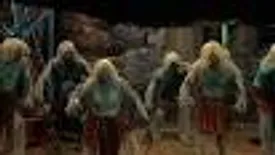H. G. Wells
H. G. Wells (1866 - 1946) was a prolific British writer best known for science fiction works such as The War of the Worlds and The Time Machine. His works have had a tremendous impact on literature, film, and media, and he is often thought of as the father of modern science fiction. But Wells wrote much more than a few well-known novels — he also wrote short stories, essays, screenplays, biographies, histories, and nonfiction pieces.
Herbert George Wells was born on September 21, 1866 in Bromley, Kent, England. He was the son of professional cricketer-turned-shopkeeper Joseph Wells, and Sarah Neal. Although Wells was born into a working-class family, his mother was determined to provide her son with the best education she could afford. She sent Wells to Morley's School in Walthamstow, where his teacher, Mr. Satchell, helped inspire a lifelong love of reading and writing.
Having earned a scholarship to the Normal School of Science (now part of Imperial College London), Wells studied zoology, geology, and astronomy. However, owing to a disagreement with his professor over his theory of natural selection, Wells left the college without earning a degree. Undeterred, he embarked upon a prolific writing career and published his first novel, The Time Machine, in 1895. Written when he was in his late twenties, this novel is often credited for helping to define the genre of science fiction.
The War of the Worlds, Wells' most famous novel, was published in 1898, and has since been adapted for radio, film, and television. In this story, an alien lifeform lands on Earth with hostile intentions. The book's themes of alien invasions, morality, and humanity's place in the universe, have made it a popular classic.
In 1908, Wells published his groundbreaking novel Ann Veronica, which was one of the first books to give a sympathetic portrayal of the Suffragette movement. Wells was a patron of the movement, and was a strong advocate of women's rights, having forced open the doors of the Royal College of Science (which had previously only accepted male students) to allow women to study there.
Wells wrote a total of 13 novel-length works, and over 50 short stories, but he is perhaps best known for his non-fiction books. The most famous of these is The Outline of History, which was published in 1920. In this book, he attempted to retrace the development of the world, from prehistory to the present day in a single volume.
Wells also wrote essays, biographies, and socio-political commentary. Always outspoken, he made arguments against censorship and expressed his admiration of Lenin and the Russian Revolution. Wells carved out a unique place for himself in the world of literature and left a tremendous legacy. His influence can be seen in the genres of science fiction and Utopian storylines, as well as in his dedication to the advancement of human rights.

